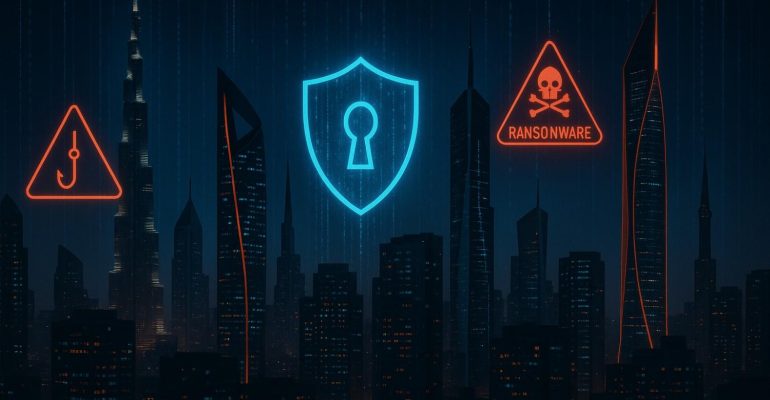Cyber Threats in MENA: What Every Business Owner Should Know

Cyber Threats in MENA: What Every Business Owner Should Know
Our project in the Middle East and North Africa (MENA) is now part of a huge digital revolution. Fintech, oil & gas, and e-commerce have become as digitally progressive as healthcare companies throughout the region that are operationalising cloud systems, now deploying smart devices along with data-driven business models.
But this digital revolution raises an immediate challenge: cybersecurity.
There is an increasing threat of Cyberattacks in MENA are rising and threatening businesses large and small. Your SME may be expanding in the UAE, or you could be a multinational organisation that has an established presence across Saudi Arabia and Egypt, but either way, if your business is not protected, then it remains vulnerable.
This blog identifies the greatest cyber risks these industry sectors face and provides practical advice for business owners keen to fortify their guard.
Why the MENA Is a Tariff for Cyber Crooks
Emerging markets — where digital expansion frequently surpasses spending on cybersecurity — offer opportunity to cybercriminals. There are many reasons attackers find MENA interesting:
- Widespread use of cloud and mobile technologies is lacking in security controls
- Rise in E-commerce and digital banking trends, & Online transactions increased
- Geopolitical upheavals that turn regional organizations into the focus of hacktivism and spies
- Poor enforcement of #cybersecurity laws in some countries
A 2024 study indicated that cyberattacks in MENA escalated by more than 35 percent during the past year, with phishing, ransomware, and DDoS attacks found to be most prevalent.
Typical Cyber Threats to MENA Companies
Phishing and Social Engineering
The emails and messages are one of the simplest, as well as most prevalent forms. Cybercriminals will dupe employees into sharing login credentials, downloading malware or transferring funds to fraudulent accounts. This is commonly in the form of:
- Supplier invoices
- IT department messages
- Bank alerts or official communications
Tip: Staff must have cybersecurity training on a regular basis.
Ransomware
Ransomware locks up your business data and requires payment (usually in cryptocurrency) for it to be unlocked. This threat is increasingly targeting:
- Hospitals
- Law firms
- Government contractors
- SMEs without robust backup systems
Recall how in 2023, a number of Gulf-based organisations were taken offline for days as part of ransomware breaches, causing monetary loss and reputational harm.
Tip: Keep offline backups and consider using endpoint protection software.
Data Breaches
Data breaches, whether due to external hackers or internal carelessness, can be particularly damaging and release sensitive customer, employee, and financial details. This can be particularly destructive in industries such as:
- Finance
- Healthcare
- Education
Due to the new data protection laws arising in countries such as Saudi Arabia, UAE, and Egypt, businesses could be legally liable for not protecting users’ information.
Tip: Enforce access controls, protect data with encryption, and audit systems on a regular basis.
DDoS (Distributed Denial of Service) Attacks
Sometimes, DDoS attacks overwhelm your servers or networks with traffic, which makes systems stop responding. What can DDoS attacks do?
- Online service disruption (e.g., e-commerce sites)
- Damage reputations
- Distract from other hacking activities
Tip: Adopt DDoS mitigation services and supervise network traffic round-the-clock.
Insider Threats
And not all attacks originate from the outside. Your employees or the independent contractors you work with who need access to private information can also intentionally or accidentally corrupt your system.
- This becomes even more important in organizations with:
- Poor access management
- No activity logging
- Poor or no IT policy use agreement
Tip: Perform background checks and monitor user behavior.
Cybersecurity Challenges Unique to MENA
- Language Barriers: Most Cyber awareness tools and platforms are in English, but most of the frontline workforce consists of Arabic, Urdu, or local language speakers.
- Legacy Infrastructure: Several companies still operate with obsolete hardware and software, particularly in industrial and government organizations.
- Lack of Cybersecurity Talent: The demand for professionals is also matched by a limited supply in some parts of the region.
- Disparate Regulations: There is a huge disparity in cyber laws throughout the MENA region, making meeting compliance difficult for businesses operating across borders.
What All Business Owners Should Do
From acceleration to agility, from customer focus and innovation, cybersecurity is no longer a worry limited to the IT staff. Here’s what you can do to start protecting your organization today:
✅ Perform a Cyber Risk Assessment Really get to know your business.
Call out weaknesses in your networks, software, and human behavior.
✅ Employ a Layered Safety Net Approach
Leverage firewalls, antivirus software, encryption tools, and access control for secure cloud services.
✅ Train Your Employees
Breach comes from human error. Regular training reduces risk dramatically.
✅ Create an Incident Response Plan
Be prepared for the worst-case scenario so your business can react and minimize damage.
✅ Partner with a Reputable CyberSecurity Company.
A local IT consultancy with experience in the Gulf and MENA can help you create a customized, compliant, and scalable cybersecurity environment.
Conclusion
As the size and complexity of the MENA cyber threat environment grow, so does the arsenal used to counter it. It is a time for business leaders who act proactively to not only prevent financial damage and legal issues but also surpass competitors by gaining the trust of customers and digital resilience.
We at Aligned Tech offer end-to-end cybersecurity services to MENA Enterprises, ranging from risk assessments and training to secure cloud deployments as well as incident response planning. We can help you create a more secure, intelligent digital foundation.
